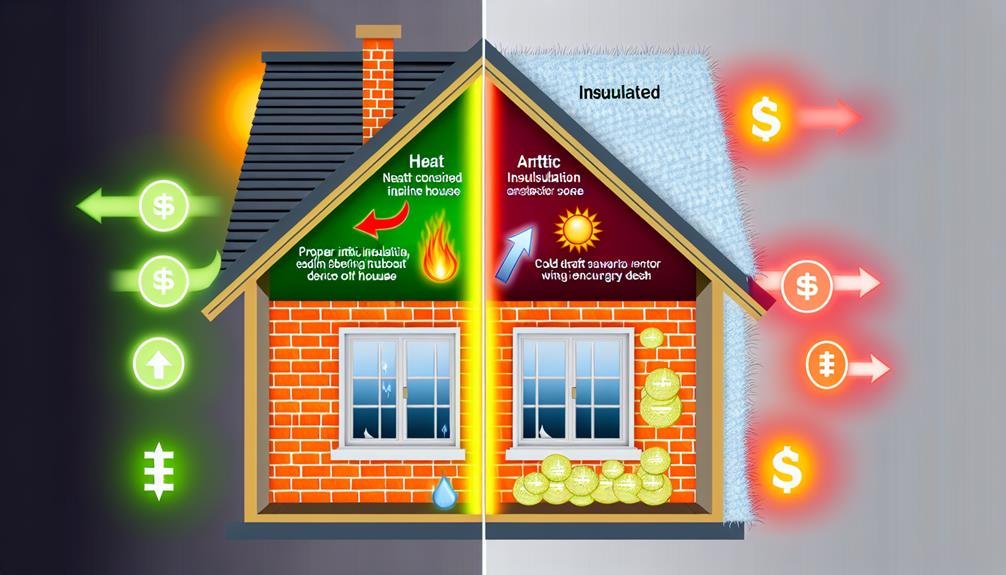Proper attic insulation is a fundamental aspect of home maintenance that often goes overlooked, yet its impact on energy bills can be significant. From maintaining a comfortable temperature indoors to reducing energy wastage, the benefits are multifaceted. However, the real question remains: how exactly does this seemingly simple upgrade translate into tangible savings? Let's explore the concrete ways in which investing in proper attic insulation can lead to lasting improvements in your household's energy consumption and overall comfort.
Key Takeaways
Contents
- Proper attic insulation significantly reduces energy bills.
- Insulation maintains consistent indoor temperatures for cost savings.
- Effective insulation minimizes heat loss and gains, optimizing energy efficiency.
- Long-term comfort and financial benefits result from adequate attic insulation.
Importance of Attic Insulation
Attic insulation plays an essential role in maintaining energy efficiency and reducing heating and cooling costs for homeowners. By properly insulating the attic, homeowners can experience significant energy savings and improved thermal comfort within their living spaces.
Energy savings are a key benefit of having adequate attic insulation. Without proper insulation, homes can lose a substantial amount of heat in the winter and gain excess heat in the summer. This results in increased energy consumption as heating and cooling systems work harder to maintain a comfortable indoor temperature. However, with effective attic insulation, the transfer of heat is minimized, leading to lower energy usage and reduced utility bills.
In addition to energy savings, attic insulation also helps enhance thermal comfort within the home. Proper insulation regulates the indoor temperature, keeping it more consistent throughout the year. This means that homeowners can enjoy a cozy and comfortable living environment regardless of the external weather conditions. Whether it's a scorching summer day or a chilly winter night, well-insulated attics contribute to maintaining a pleasant indoor climate.
Energy Efficiency Benefits
Effective insulation in the attic contributes substantially to the overall energy efficiency of a home, resulting in reduced utility costs and improved environmental sustainability. Properly insulating your attic can have a significant impact on the energy efficiency of your home by preventing heat loss in the winter and heat gain in the summer. This not only leads to a more comfortable living environment but also helps to lower your carbon footprint and reduce energy consumption.
- Environmental Impact: By reducing the amount of energy needed to heat or cool your home, proper attic insulation helps lower greenhouse gas emissions and decreases your overall environmental impact. It contributes to a more sustainable lifestyle and aligns with efforts to combat climate change.
- Energy Savings: Insulating your attic effectively can lead to substantial energy savings over time. By minimizing the transfer of heat through the roof, insulation reduces the workload on your heating and cooling systems, resulting in lower energy bills and increased cost savings.
- Insulation Materials and Installation Process: The choice of insulation materials, such as fiberglass, cellulose, or spray foam, can impact the effectiveness of your attic insulation. Additionally, ensuring essential installation, including sealing air leaks and covering all areas thoroughly, is vital for maximizing energy efficiency benefits.
Cost Savings Analysis
Analyzing the cost savings associated with proper attic insulation reveals the potential financial benefits of investing in energy-efficient measures for your home. When considering attic insulation, it's thus important to weigh the cost-effectiveness of different insulation types. While initial costs vary, the long-term savings can be substantial. Comparing insulation types like fiberglass, cellulose, spray foam, and radiant barriers can help determine the most cost-effective option for your needs.
Professional installation of attic insulation may come with a higher upfront cost but can provide significant long-term savings. Experts ensure proper installation, maximizing the insulation's efficiency and minimizing energy loss. They can also offer advice on the best insulation type for your home, taking into account factors like climate and energy usage patterns.
On the other hand, there are DIY options for installing attic insulation that can be more budget-friendly. While the initial savings might seem appealing, it's crucial to consider the long-term energy savings and effectiveness of self-installed insulation. DIY enthusiasts should follow manufacturer guidelines carefully to achieve optimal results and avoid potential issues down the line.
Seasonal Temperature Regulation
Maintaining consistent indoor temperatures throughout the changing seasons is important for best energy efficiency and comfort in residential spaces. Proper attic insulation plays an important role in regulating temperatures and reducing energy consumption. Here are three key points to take into account for effective seasonal temperature control:
- Reduced Energy Consumption: Well-insulated attics help in maintaining desired temperatures, reducing the need for constant heating or cooling. This results in lower energy consumption throughout the year, leading to cost savings on utility bills.
- Enhanced Comfort: By having proper attic insulation, homeowners can enjoy more stable indoor temperatures regardless of the season. This creates a comfortable living environment and reduces the need to adjust thermostats frequently, improving overall comfort levels.
- Prevention of Temperature Fluctuations: Inadequate insulation can lead to temperature fluctuations inside the house, making it harder to maintain a consistent and comfortable environment. Proper attic insulation acts as a barrier against external temperature changes, helping to stabilize indoor temperatures.
Long-Term Home Comfort
Long-term home comfort is a fundamental aspect of ensuring a consistent and pleasant living environment for homeowners. When considering home renovation projects aimed at enhancing comfort, adequate insulation is a key factor to address. Insulation materials play an important role in maintaining a comfortable indoor temperature throughout the year.
Proper insulation, such as fiberglass, cellulose, or spray foam, helps regulate the temperature inside the home by reducing heat transfer. During hot summers, insulation prevents the penetration of external heat, keeping the interior cool and comfortable. In cold winters, it acts as a barrier to retain heat indoors, creating a cozy atmosphere. By investing in high-quality insulation materials during home renovation projects, homeowners can improve their long-term comfort levels.
In addition to temperature regulation, insulation also contributes to soundproofing, reducing noise from outside sources and enhancing overall tranquility within the home. This aspect is particularly important for individuals seeking a peaceful living environment free from disturbances.

